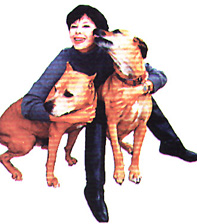GOLDSEA | ASIAMS.NET | ASIAN AMERICAN PERSONALITIES
THE UNFORGIVEN
PAGE 2 OF 2
| "It was a love story with a racist. White men could sleep with an Asian and give children but could not marry her." |
Nuyen is dismissive of the recent increase in Asian media visibility. "Now there is interest. The background is war, the conflict of veterans. They have a white man there." She is determined not to see Heaven and Earth because it is yet another war movie. "It's a fad. Thirty years ago there was Flower Drum Song," says Nuyen. "I know because I was part of that fad."
Prior to the 50s what few Asian movie parts there were were often played by Whites. Among those was Fu Manchu played by Swede Warner Oland who also played Charlie Chan, as did Sidney Toler and Peter Ustinov. Nyrna Loy's pre-Thin Man career was based on impersonating Asians, and Louise Rainer and Katharine Hepburn played Chinese in The Good Earth in 1936 and Dragon Seed in 1944. Not only did Rainer win an Oscar for it, she had originally been cast in preference over Anna May Wong. Wong was instead offered the role of Lotus, a concubine, in The Good Earth and -- showing admirable courage and dignity -- turned it down.
Anna May Wong eventually left Hollywood for Europe to escape the dragon-lady roles that were constantly being pushed on her. "I got so weary of it all," Wong later reflected.
Two decades later Nuyen may have fared a bit better but the Chinese half of her ancestry continued to dictate the roles she was offered. She made the cover of Life, albeit in the guise of her Suzie Wong character. In 1962 she returned to Hawaii to shoot another interracial potboiler, Diamond Head, opposite Charlton Heston. "It was a love story with a racist," says Nuyen. "White men could sleep with an Asian and give children but could not marry her." The movie was based on the story of the Robinson family which now owns 15% of the island of Kauai.
After the early 60s the Asian fad peaked. Nuyen starred in about a dozen B movies, then appeared as a regular in TV series like Hawaii Five-O, I-Spy and Star Trek. Her least stereotypical role was playing a French-Vietnamese surgeon in St. Elsewhere, a part that lasted four years.
"There's a mystique," she says in trying to explain the Hollywood compulsion. "The white man idealizes and totally dismisses the human being. Polynesian women are a fantasy of primal passion. Asians are more of a possession, like jade, a gemstone. The white man has a difficult time seeing women in general, especially women of color. Liat is part of that fantasy."
Once adored for her youthful vibrance, Nuyen is in the autumn of her life, but resists living in the past. She was surprised, however, that the 50th anniversary celebration of South Pacific didn't include her.

Nuyen was married to Robert Culp, then to a psychiatrist with whom she had a daughter. The men are gone but the 30-year-old daughter is happily married in western Canada. Theirs is a better relationship than those of the Joy Luck mothers with their daughters.
 uyen was born in France to a French mother and Chinese father. She is loath to discuss her father. Her mother and grandfather were persecuted by the occupying Germans during the war for being gypsies. Nuyen was raised in Marseilles by a cousin, "an orchid raiser who was the only person who gave a damn about me." He taught her the love of art, philosophy, children, animals and gardening, a passion she indulges even today. The walls are covered with original paintings. The many books are another testament to his influence.
uyen was born in France to a French mother and Chinese father. She is loath to discuss her father. Her mother and grandfather were persecuted by the occupying Germans during the war for being gypsies. Nuyen was raised in Marseilles by a cousin, "an orchid raiser who was the only person who gave a damn about me." He taught her the love of art, philosophy, children, animals and gardening, a passion she indulges even today. The walls are covered with original paintings. The many books are another testament to his influence.
She was 18 before even meeting another Asian. French is her first language and she speaks no Asian languages. She feels French inside, she says.
Despite her Gallic sensibility, the world regards her as an Asian. This paradox may explain the lingering indentity crisis of a woman who feels displaced -- French on the inside, Asian in appearance, living in Beverly Hills but wishing she could live in Hawaii, her favorite place.
Nuyen is well traveled, but the only time she has traveled to Asia is during locations shoots in Hong Kong and Macau. And she refuses to go to Tahiti.
Just about the only subject Nuyen doesn't discuss freely is her tempestuous affair with Marlon Brando in the 60s. "I never talk about him. He has enough people talking abo9ut him, why should I?"
She is as active in helping battered and abused children as she is in acting -- another legacy from her cousin. "I need to be surrounded by beauty," she says. "I am very much my own person."
CONTACT US
|
ADVERTISING INFO
© 1996-2013 Asian Media Group Inc
No part of the contents of this site may be reproduced without prior written permission.
